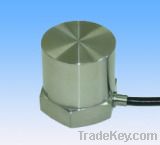Product Description
Small in size, light in weight, high
frequency response, wide measurement range, wide ambient
temperature range, large overload capacity. It is widely applied
to military projects, vehicles, bridge inspection and other
fields for safe monitoring, automobile crash test, earthquake
monitoring, structure monitoring, environment monitoring,
vibration detecting of projects, geological exploration, the
vibration detecting & analysis of railway, bridges, dames,
high buildings, etc.
An accelerometer is a device that
measures proper acceleration. This is not necessarily the
same as the coordinate acceleration (change of velocity of the
device in space), but is rather the type of acceleration
associated with the phenomenon of weight experienced by a test
mass that resides in the frame of reference of the accelerometer
device. For an example of where these types of acceleration
differ, an accelerometer will measure a value when sitting on the
ground, because masses there have weights, even though they do
not change velocity. However, an accelerometer in gravitational
free fall toward the center of the Earth will measure a value of
zero because, even though its speed is increasing, it is in an
inertial frame of reference, in which it is weightless.
An accelerometer thus measures
weight per unit of (test) mass, a quantity also known as specific
force, or g-force. Another way of stating this is that by
measuring weight, an accelerometer measures the acceleration of
the free-fall reference frame (inertial reference frame) relative
to itself.
Most accelerometers do not display
the value they measure, but supply it to other devices. Real
accelerometers also have practical limitations in how quickly
they respond to changes in acceleration, and cannot respond to
changes above a certain frequency of change.
Single- and multi-axis models of
accelerometer are available to detect magnitude and direction of
the proper acceleration (or g-force), as a vector quantity, and
can be used to sense orientation (because direction of weight
changes), coordinate acceleration (so long as it produces g-force
or a change in g-force), vibration, shock, and falling (a case
where the proper acceleration changes, since it tends toward
zero). Micromachined accelerometers are increasingly present in
portable electronic devices and video game controllers, to detect
the position of the device or provide for game .
Pairs of accelerometers extended
over a region of space can be used to detect differences
(gradients) in the proper accelerations of frames of references
associated with those points. These devices are called
gradiometers, as they measure gradients in the gravitational
field. Such pairs of accelerometers in theory may also be able to
detect gravity waves.
| Country: |
China |
| Model No: |
ELA
|
| FOB Price: |
(Negotiable)
Get Latest Price
|
| Place of Origin: |
China |
| Price for Minimum Order: |
- |
| Minimum Order Quantity: |
10 Piece |
| Packaging Detail: |
export standard packaging |
| Delivery Time: |
- |
| Supplying Ability: |
- |
| Payment Type: |
T/T |
| Product Group : |
- |

